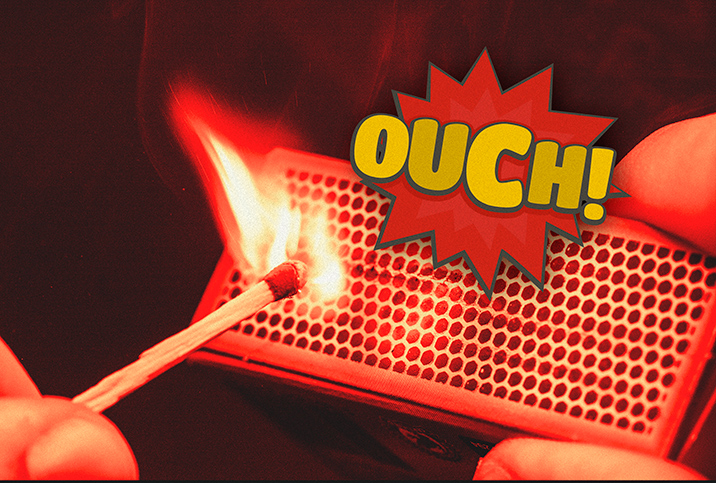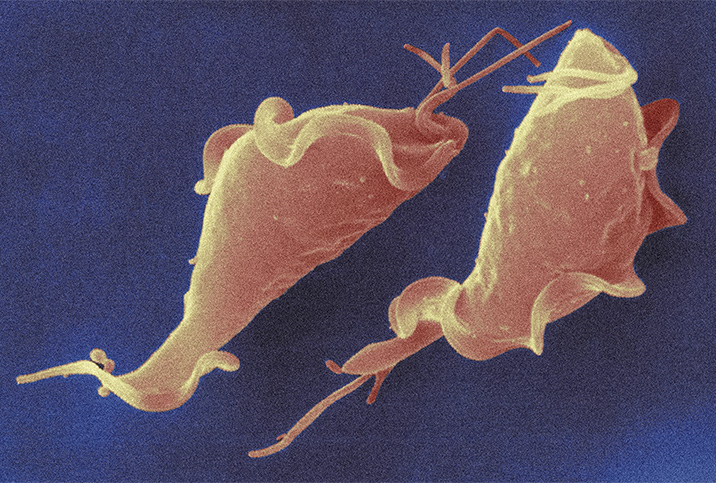Why Does My Penis Feel Like It's on Fire?

Too much frisky friction to common infections, there are many medical reasons why a man may feel like his penis is on fire. None of them involve flames.
A golden rule of the internet age is partly a joke, but with a grain of truth behind it: Don't Google your health issues. If you wake up and notice a burning sensation in your penis, possible diagnoses pulled from the "related health conditions" section of Google's search results may include: nongonococcal urethritis, friction burn, balanitis, gonorrhea, urinary tract infection (UTI), kidney stones, prostatitis, painful bladder syndrome and yeast infection.
It's a long list, with solutions ranging from "cut back on masturbating for a few days" to "seek out a doctor immediately." We weighed in with some experts to help you figure out the root cause of your burning penile pain.
Is an STI why your penis is burning?
The first questions to ask and answer include: "Have I been sexually active? With whom? Did I use protection?" Those answers could help rule out a few conditions, but even then, trying to figure it out for yourself might prove difficult.
"[For example,] a common symptom of both UTIs and some bacterial sexually transmitted infections is feeling pain or burning when urinating," said Julia Bennett, M.P.H., the director of digital education and learning strategy at Planned Parenthood Federation of America. "STI symptoms range in severity and often depend on the type of infection. Most of the time, there are no symptoms at all."
In cases where symptoms do appear, the United Kingdom's National Health Services (NHS) states that STI symptoms arrive at varying intervals but typically within one to four weeks. However, a significant number of these symptoms—such as those associated with scabies, genital warts, genital herpes, chlamydia and trichomoniasis— can show up months, even years, later.
Still, you may find solace in knowing that if you experience pain and haven't had unprotected sex in the past year or so, you could likely be facing another issue. Of course, this circumstance doesn't totally rule out an STI, either.
A good rule of thumb is to get tested if you experience any type of penile pain, especially burning.
"Signs of these infections can look and feel different for everyone, so testing is the only way to be certain of what's going on," Bennett said. "Tell a doctor or nurse about your symptoms, and they can help determine what kinds of testing or treatment is right for you."
She also acknowledged testing for STIs can differ based on symptoms and sexual history, but generally, tests fall into one of several categories: a urine test, a cheek swab, a blood test or a physical exam. In other scenarios, doctors may have to collect a swab of discharge—if there is any—from your genitals or any open sores or blisters.
Once the test results are back, doctors can offer treatment options. Many cases of sexually transmitted infections can be treated with antibiotics. In cases of HIV or genital herpes, doctors may prescribe antiviral medications, though both diseases will still be transmittable.
Other causes of burning penis pain
STIs aren't the only conditions that can cause your dick to burn. Even a man who has had zero sexual partners might one day find himself wincing as he struggles to urinate. Doctors could rule out a few conditions in this instance, but it still wouldn't be a cut-and-dried diagnosis.
Several factors need to be considered when addressing penis pain, but one of the most prominent is, simply, age. As men get older, issues tend to arise, and the most common ones revolve around the prostate.
"Diseases of the prostate are almost a normal part of aging," said Jonathan Shoag, M.D., a urologist at University Hospitals in Cleveland. "As men get older, almost everyone is going to have a problem with his prostate. The two diseases that are most common are a benign enlargement of the prostate—we call it BPH—and that tends to cause urinary symptoms: urgency, frequently waking up at night. It's not cancer, but it can significantly impair quality of life. The other prostate disease that's very common with age is prostate cancer."
Shoag said the goal with prostate cancer, and the reason for prostate exams, is to detect it before it spreads or becomes symptomatic. It can be a highly treatable disease with a fantastic success rate, but if left unchecked, it can spread to other parts of the body, particularly the bones, which can be quite painful and cause urinary issues.
Of course, there are more visually obvious causes of penile pain. Peyronie's disease, for example, is a condition in which the penis is curved due to a buildup of plaque, leading to painful erections. You might have kidney stones or perhaps a bladder infection. Sometimes, the hair follicles on the genitals can get infected. A more obvious cause of pain might be a penile fracture, which would be difficult to miss.
What do I do if my penis feels like it's on fire?
It would be nearly impossible to cover every issue that could plague your penis and cause pain. The simple truth of the matter is that many of these issues share symptoms, and if you feel pain in your penis, you aren't likely to stop and calmly rationalize whether the pain is acute, sharp, throbbing, stinging, burning or pricking.
Furthermore, the causes of so many of these pains are internal. Whether the cause is infection, disease, inflammation or cancer, it's often difficult to tell from an untrained perspective. The conclusion, then, is rather obvious: If your penis hurts, see a doctor.


















